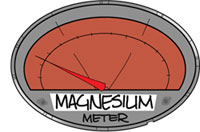Abstract Magnesium citrate is one of the most popular types of magnesium supplements, and it is readily absorbed into the body. Magnesium is determined by what it is bound to (for example, magnesium citrate is magnesium bound to citric acid), and some forms are absorbed more easily by your body than others. Sulfates are fine at low doses but are not very well absorbed by the body.
The best way for magnesium to be absorbed is via the highly absorbed form of a supplement. Another factor affecting magnesium absorption is an individuals existing magnesium levels since magnesium will absorb less quickly if the levels are already sufficient in the body, and excretes via the urine or stool if given in excessive amounts. The body also helps maintain magnesium levels when stores are low, by restricting how much is excreted through the urine and by absorption of more magnesium from the gut.

Magnesium levels in the body are not determined by merely choosing the most absorbable magnesium from food sources. In this age, a proper magnesium diet needs to consider not only the most absorbable magnesium sources but also the individual differences that may inhibit magnesium absorption from the diet. The body generally only absorbs about 20-50 percent of magnesium consumed, so understanding factors that may enhance or inhibit magnesium absorption is an important first step in correcting deficiencies and increasing magnesium intake. With dietary intake, approximately 30-40% of magnesium is absorbed, but absorption differs depending on the quantity of magnesium consumed and the food matrix composition.
Calcium and magnesium are both absorbed in the same manner in the body, so they may crowd one another out and limit your body’s maximal absorption rates. Magnesium may not be well-absorbed by the body, so optimizing your gut health is essential for maximum benefits. Magnesium helps the body regulate zinc levels, and zinc allows magnesium to be more effectively absorbed. Magnesium glycinate is absorbed readily by your body and can have soothing effects.
Magnesium bis-glycinate is absorbed well, and you will not experience the stomach discomfort sometimes associated with magnesium supplements. When combined with magnesium, malic acid makes an energizing supplement. The weak ionic bonds of magnesium and malic acid are easy to break, making magnesium malate easily soluble and thus absorbed into the body. Magnesium Chloride is well absorbed by your digestive tract, making it an excellent all-purpose supplement.
This kind of magnesium supplement is best for everything related to cardiovascular health – heart palpitations, irregular heartbeat, high blood pressure, etc. This is one of the best magnesium supplements, as it has an excellent absorption rate and provides a soothing effect to your body. While proper magnesium levels may play a role in relaxing muscles and relieving stress, there is little evidence that suggests Magnesium Sulfate is well-absorbed through your skin (10). Magnesium is an essential mineral for eating and is one of the main metals used in maintaining a healthy, working body; however, only about 30%-40% of magnesium in your diet is generally absorbed into your body, meaning magnesium deficiencies are extremely common.